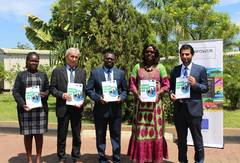Skill Development Efforts in South Sudan Misaligned with Labour Market Demands
It is estimated that 70% of South Sudan’s population are young women and men, and 59% of the working age population have been unemployed for over a year. There is an urgent need to productively engage young people to deter them from involvement in the nation’s security situation and stabilize and improve the economy. Many youth do not have opportunities to improve their livelihoods. Technical and Vocational Education and Training (TVET) serves as an important avenue for the challenge, but current TVET provision is not matching up with the demands and needs of the labour market. These findings are part of the labour market assessment/review by the Ministry of Labour, Public Service and Human Resource Development with support from UNESCO and EMPOWER project (funded by the European Union) that was launched on 14 November 2018 in Juba, South Sudan.
The labour market assessment/review found that most of South Sudan’s economy is currently made up of multiple small local markets that operate in isolation and the workforce needs more skill development support beyond subsistence farming as well as the different labour market needs of each community throughout the country. Thus, area-based approaches are vital to ensure TVET provision is labour market responsive. Furthermore, the provision of TVET in the country does not align with the real needs of the labour market. For example, if tailoring courses are offered when there is an oversupply of imported garments in the market, graduates of tailoring courses will struggle to find economic/job opportunities, which leads to the inefficient use of the already limited funds for the sector and continue the vicious cycle of unemployment and economic decline.
Ms. Ann Therese Ndong Jatta, UNESCO Regional Director for Eastern Africa, who made remarks at the launch, “urge[d] all stakeholders to invest in and exercise TVET, vocational training and skill development programmes in a streamlined and labour market responsive manner. Young people in South Sudan need it for their future. Families and communities need it for their future. The country needs it for its future. If we do not address the challenges, South Sudan risks leaving the over 70% of its population behind.”
“TVET and productive economic engagement in the labour market requires alignment of supply and demand, if not, unemployment will continue to increase and the inefficient use of investments in the skills development sector,” said Sardar Umar Alam, UNESCO’s Representative to South Sudan. “Human capital development requires evidence-based planning, and when we offer skills in demand, the young people in South Sudan will have the opportunity to maximize their potential and support their families, communities and the country.”
“TVET providers need to improve their links with the business community to ensure that youth are trained in skills demanded in their local markets. This will improve their access training and employment opportunities with local businesses,” said Rehana Zawar, Norwegian Refugee Council’s Country Director and EMPOWER project representative. “For youth to start their own businesses, as well as for existing businesses to grow, they need improved access to financial capital alongside business training and mentoring.”
Other speakers at the launch included Deputy Minister of Labour, Public Service and Human Resource Development, representatives from the Embassy of Sweden and Norway and Undersecretary of Labour, Public Service and Human Resource Development. Other notable attendees included USAID, EU Commission, World Bank and other development partners.
The study notes the high-cost of transport, producing products in large quantities, challenges in keeping markets local and limited access to accessing financial capital, which limits the national economy that could move surplus products beyond local markets. The study recommends – depending on the geographical location – to strengthen agricultural skill provision (including livestock) and also offering such skills as auto-mechanics, food preparation/processing, dairy farming, consumer good production (such as soap/beauty products), etc., which build on South Sudan’s needs and comparative advantages.
The assessment/review was developed under UNESCO’s Capacity Development for Education (CapED) programme supported by Finland, Norway, Sweden and Dubai Cares and the EMPOWER project funded by the EU.
The Labour Market Assessment and Review can be accessed here: http://www.unesco.org/new/fileadmin/MULTIMEDIA/FIELD/juba/pdf/MoL_UNESCO_EMPOWER_LMA.pdf
<- Back to: All news

